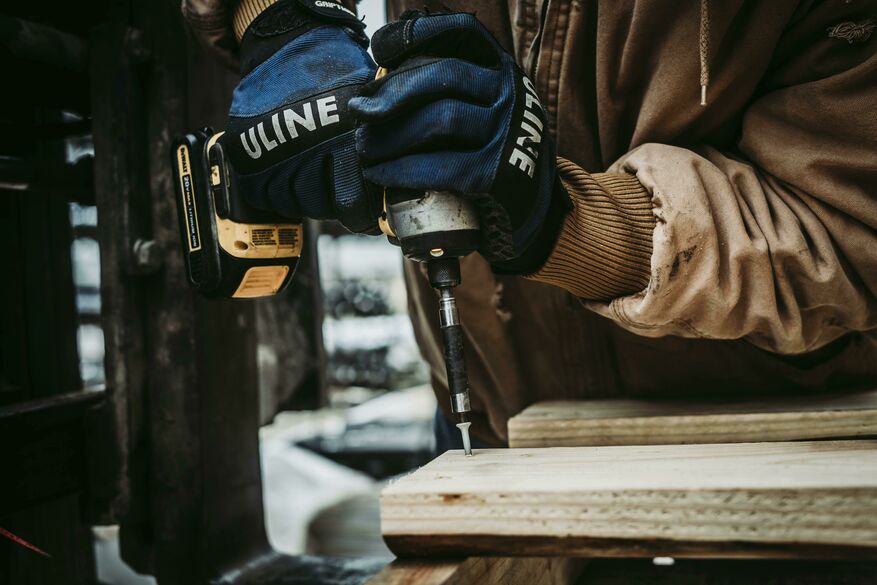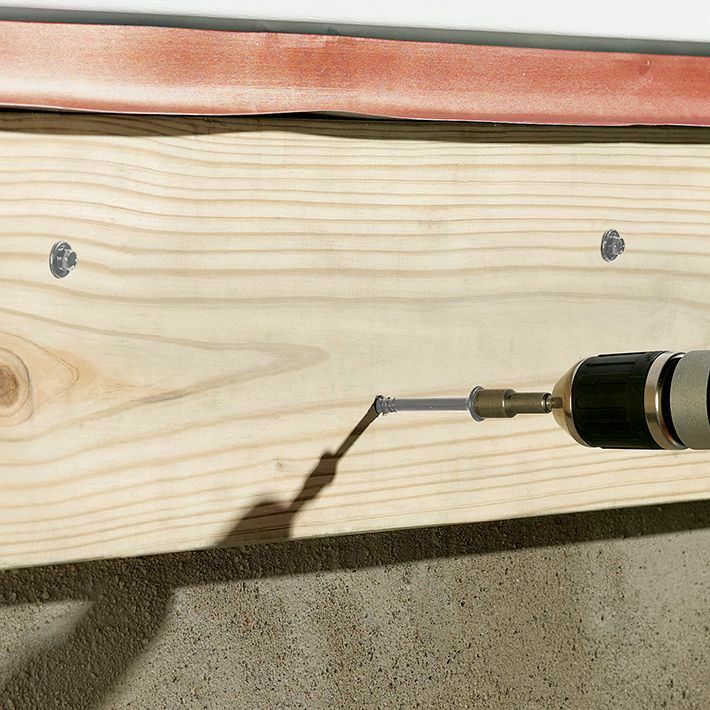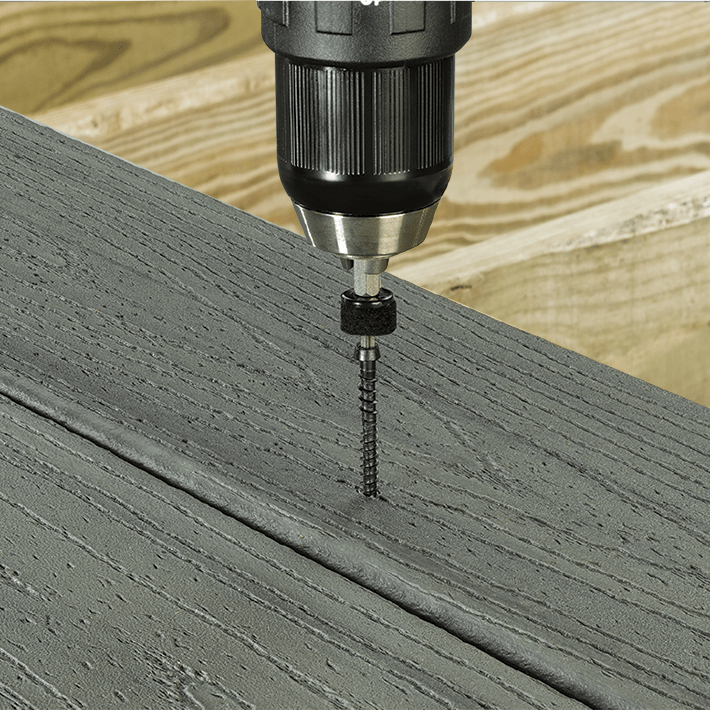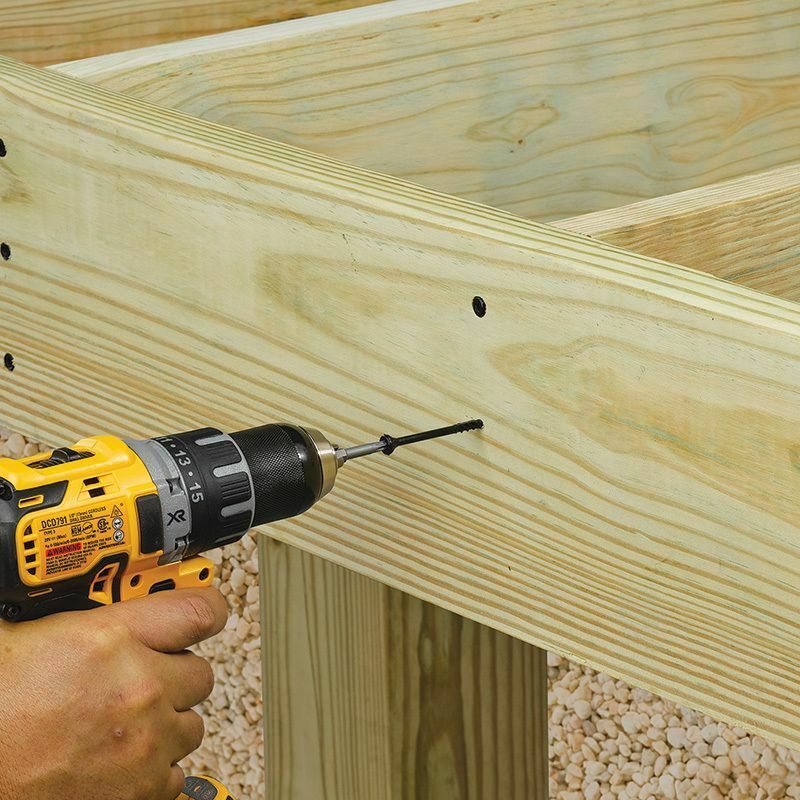Creating a stunning deck that will expand livable space in a home and give homeowners the connection to the outdoors requires choosing the right decking components, from the type of decking down to the screws and fasteners used to hold the deck together.
Every component must be carefully chosen for durability, ease of use, cost and longevity. There are almost as many types of fasteners as there are types of decking, but this guide will help you choose the right decking screws for any decking project.
Importance of Choosing the Right Screws
Safety, durability and aesthetic value are all factors that go into choosing the right decking screws for a project. Decking screws should be corrosion-resistant so that they won’t fail under wet weather conditions or in extreme climates.
The thread design of the screw also matters because if you choose decking screws that don’t have proper head design and length, the screws won’t have the grip and security needed to keep the screws from loosening over time.
When deck builders and contractors don’t use the right decking screws, homeowners can end up facing costly repairs or a deck that loses structural integrity after a short time. Builders that take pride in their work and reputation know that using the right decking screws to build a deck is essential to building a deck that will last and complete homeowner satisfaction.
Impact on Deck Durability
Structural screws that are designed for decking are exceptionally strong and made to withstand extreme weather, foot traffic, and the weight of furniture, grills and other items customarily used on decks.
Ordinary screws, even those used successfully in other building projects, aren’t strong or durable enough to be used for building decks.
Safety Considerations
Choosing the right decking screws is also a matter of safety for your crew and the homeowners.
Using screws that aren’t designed for decking or that aren’t strong enough to hold a deck together puts your crew at risk of decking coming loose and causing accidents on the job site. You don’t want your crew members injured and out of work because the wrong materials were used for the job.
If the screws used aren’t the correct screws for the decking material, they won’t have the strong bond necessary to make the deck safe for people to use. Even if the screws seem to tighten at first, over time, they will loosen and make the deck unsafe.
Types of Decking Screws
When choosing the right decking screws, the first thing that you need to consider is the material of the screw. Different types of decking screws have various benefits and are best used with specific types of decking materials.
Wood Decking Screws
Wood decking screws are specialized fasteners carefully designed to securely attach wood decking boards to the underlying deck framework. Unlike traditional screws, wood decking screws have sharp self-drilling tips and threading designed to prevent splitting in wood. The design also gives the screws a tighter grip.
Wood screws are typically used with any natural wood decking materials, including pressure-treated lumber. The most significant benefits of using wood screws include:
- Exceptional Durability: Wood screws are very resistant to corrosion. They are a smart choice for wood decks and railings located in wet climates or areas with extreme temperatures, big swings in temperature in the summer and winter, and outdoor applications where the wood will have high UV exposure.
- Secure Fastening: The deep threading and sharp tips of wood screws are perfect for creating a secure hold in wood decking materials, reducing the risk of board movement, squeaks or instability over time.
- Ease of Installation: Self-drilling wood screws minimize the need for pre-drilling, which can mean faster installation for your crew and lower costs for you.
Composite Screws
Composite decking screws are deck fasteners best suited for installing composite decking materials. These screws are made to work with composite boards and their unique properties like flexibility and thermal expansion and contraction.
If you’re building a deck using composite boards, you should use composite decking screws because they are designed for:
- Split and Crack Prevention: Composite decking screws have unique thread designs and cutting tips specifically designed to work with composite boards that reduce the risk of mushrooming or damaging the material during installation, even near the board edges.
- Clean Finishes: Composite decking screw heads can be color-matched to blend seamlessly into composite decking boards. They also have countersinking profiles for a flush appearance that doesn’t detract from the aesthetic appeal of the boards.
- Corrosion Resistance: Coated or stainless-steel composite screws resist corrosion and staining, so they are durable and safe to use in any type of climate.
Differences from Wood Screws
Composite screws have finer threading and distinct cutting tips made to work perfectly with the dense synthetic texture of composite deck boards so that they don’t split or crack the boards.
They have reverse threads near the head to pull the material down tightly, eliminating mushrooming on composite surfaces. Composite screws can also have color-matched, low-profile heads for a clean, flush finish that blends with the composite decking material.
Stainless Steel Screws
Stainless steel decking screws are high-performance deck fasteners made from corrosion-resistant stainless steel. Their strength and resistance to rust and corrosion make them the ideal deck fasteners for decks in coastal or salt water climates.
Stainless steel screws have sharp, self-drilling tips and threads engineered for secure fastening in wood, composite and hardwood decking. Stainless steel screws maintain structural integrity over time and are available in various grades, such as 304 and 316.
They are the best choice for decking projects where resistance to rust and corrosion is the most critical factor. They create a secure connection and can keep decks strong even in extremely wet areas.
Screw Size and Length Considerations
The material of the screw is just one consideration that will impact the effectiveness and strength of the screw’s ability to hold. Choosing the right screw size and length is also necessary to create a high-performance deck that will stand up to weather and wear and tear.
General Sizing Guidelines
In general, if the deck you’re building is made from standard wood or composite decking boards, screws should typically be 2.5 inches to 3 inches in length to make sure that they can go at least 1 inch into the deck boards.
Thicker or hardwood decking may require screws up to 3.5 inches for secure attachment.
Thicker screws provide greater strength for heavy-duty applications. For hidden fasteners or pre-grooved boards, screw sizing should align with the system specifications. Choosing the correct screw size is essential to prevent issues like loosening, splitting and compromised deck performance.
Factors Affecting Length Selection
The thickness of the decking material is just one of the factors that should play a role in the length section of the decking screws that are used on a deck build or rebuild. The deck type, load requirements and environmental factors should also be considered when choosing the length of deck screws.
Best Practices for Installation
Once you have chosen the right deck screws for a deck project, you should also always follow the installation best practices for the decking screws and decking material that you’ve chosen, including using the right drilling equipment and proper torque settings during installation.
Pre-Drilling vs. No Pre-Drilling
Choosing between pre-drilling and no-pre-drilling deck screws depends on the decking material, the screw design and the project requirements.
Pre-drilling deck screws makes it easier for those screws to penetrate dense materials smoothly and with perfect alignment.
Self-drilling screws eliminate the need for pre-drilling. They save time and labor and are often used with softer wood decking, pressure-treated lumber decking and composite decking.
Proper Torque Settings
Installation best practices also include using the proper torque settings for the type of decking fasteners you’ve chosen.
Proper torque settings for deck screws allow for secure fastening without damaging the decking material. Over-torquing decking fasteners can strip threads, damage screws or cause indentations in composite or softwood decking.
Over time, those indentions can make the deck look bad or compromise the structural integrity of the finished deck.
Under-torquing, on the other hand, may result in loose screws and an unstable deck. For softer materials, start with a lower torque setting and gradually increase until screws sit flush without over-sinking. In harder woods or composites, moderate torque prevents splitting or mushrooming.
Find the Right Decking Screws for Your Next Project
When searching for the perfect screws for your next deck project, consider their material, size and length.
Then, take a look at FastenMaster’s full range of decking solutions so that you can build decks you won’t worry about staking your reputation on.




